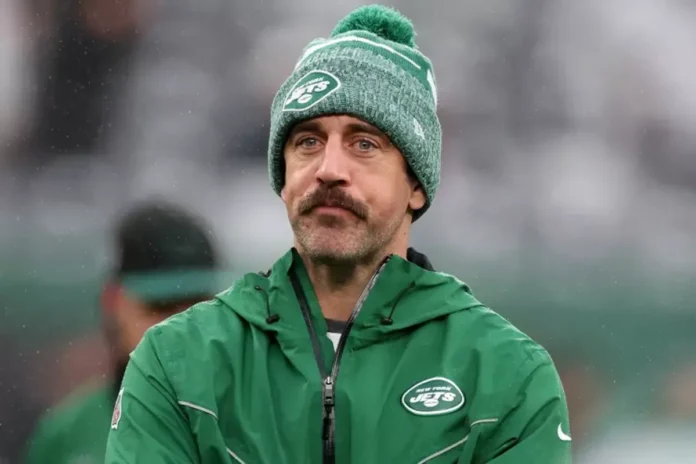The New York Jets have decided to part ways with quarterback Aaron Rodgers following a disappointing season.
The team’s management emphasized the need for change as they look ahead to the future. This decision marks a major shift for the franchise, which had high hopes when they acquired Rodgers.
Rodgers, a four-time NFL MVP, joined the Jets with expectations of leading them to playoff success. However, injuries and inconsistent performances plagued his season, preventing the team from reaching its goals. His departure signals a fresh start for the organization as they explore new quarterback options.
General Manager Joe Douglas acknowledged the difficulty of the decision but stressed the importance of progress. He expressed gratitude for Rodgers’ contributions while highlighting the need to build a competitive roster. The team believes a different approach will yield better results moving forward.
Rodgers’ tenure with the Jets was short-lived, as injuries sidelined him early in the season. His absence forced the team to rely on backup quarterbacks, which contributed to their struggles. Fans had anticipated a turnaround, but the season did not unfold as expected.
Head coach Robert Saleh expressed appreciation for Rodgers’ leadership and experience but admitted the team must take a different direction. He emphasized the importance of developing a stable and effective offense. Saleh remains optimistic about the team’s future despite the challenges faced this season.
The Jets had invested heavily in Rodgers, hoping his veteran presence would elevate the team’s performance. Unfortunately, his impact was limited due to his injury, leaving management with tough decisions. The franchise now aims to restructure its roster to create a more sustainable path to success.
Rodgers’ departure leaves the Jets with significant salary cap space, allowing them to explore potential replacements. The team may target a younger quarterback through the draft or free agency. This transition presents an opportunity to establish a new foundation for long-term competitiveness.
Fans reacted with mixed emotions, as many had high hopes for Rodgers’ tenure with the team. Some supporters expressed disappointment, while others understood the necessity of moving in a new direction. The organization remains committed to assembling a strong squad capable of competing at the highest level.
Rodgers’ future in the NFL remains uncertain as he evaluates his next steps. Some analysts speculate that he may consider retirement, while others believe he could join another team. His experience and talent ensure he will have options if he chooses to continue playing.
The Jets’ decision reflects their desire to rebuild and focus on a fresh strategy. They plan to reassess their offensive approach and invest in a more durable quarterback. Management remains confident that these changes will lead to a more successful and stable future.
Despite Rodgers’ departure, the Jets still have a strong core of talented players on their roster. They intend to strengthen key positions and reinforce their depth in the upcoming offseason. The franchise remains dedicated to delivering better results for its loyal fan base.
While Rodgers’ time with the Jets did not meet expectations, his presence brought valuable insights to the team. His leadership helped younger players develop, leaving a lasting impact despite his short stay. The organization acknowledges his contributions and wishes him success in the future.
As the team moves forward, they aim to rebuild trust with their fans by making strategic improvements. Management understands the frustrations of supporters and remains committed to long-term success. They believe this transition will provide the necessary changes for a more competitive squad.
The upcoming season presents an opportunity for the Jets to redefine their identity. By focusing on player development and strengthening key areas, they hope to build a more resilient team. Their goal is to ensure long-term stability and sustained success in the league.
Rodgers’ departure also highlights the unpredictable nature of professional football. Injuries, expectations, and team dynamics often shape the fate of a player’s tenure with a franchise. The Jets are now tasked with adapting and moving forward in pursuit of a brighter future.
The organization’s leadership remains determined to make calculated moves that enhance the team’s overall performance. They plan to assess all available options before making decisions regarding their next quarterback. Their primary objective is to position the Jets for consistent success.
As free agency approaches, speculation continues about who might replace Rodgers as the team’s starting quarterback. The Jets’ front office remains focused on securing a reliable and talented player for the role. They recognize the importance of stability at the quarterback position.
Fans eagerly await the team’s next move as management navigates this transitional phase. The Jets understand the significance of this decision and its impact on future seasons. Their focus remains on building a competitive squad that can contend in the league.
While Rodgers’ departure marks the end of an era, it also signals a new beginning for the franchise. The team embraces the challenge of constructing a roster capable of sustained success. With a clear vision, they move forward with determination and optimism.
Ultimately, the Jets’ decision reflects their commitment to growth and long-term competitiveness. They recognize the importance of adapting to challenges and making necessary adjustments. As they prepare for the next chapter, the franchise remains dedicated to building a winning culture.
With a new direction in place, the Jets aim to turn setbacks into opportunities for growth. Their leadership believes in the potential of the team and the possibilities ahead. Fans remain hopeful that these changes will lead to a brighter future for the franchise.


